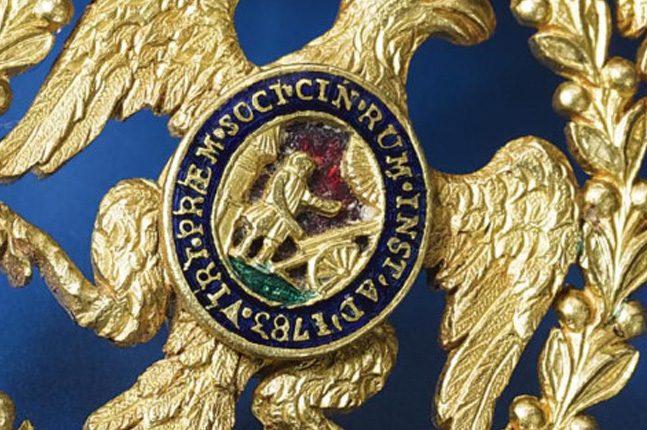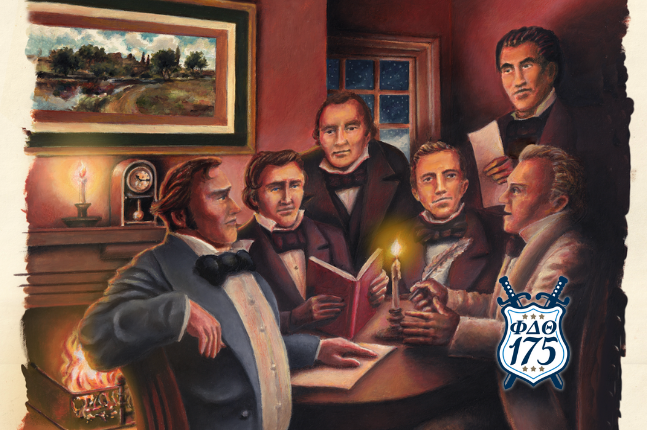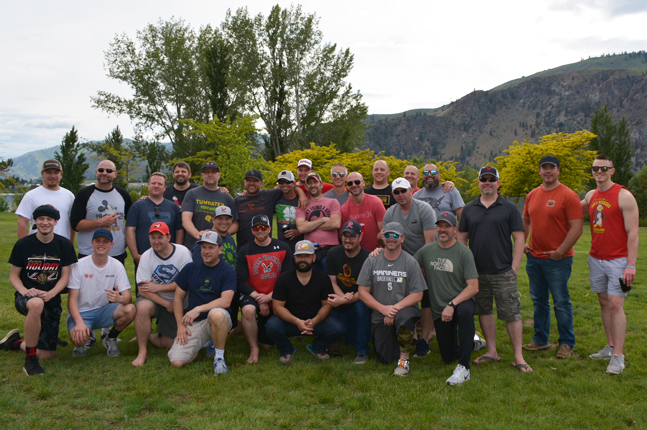By Bryan Scott Johnson, Clemson ’81
We should all be quite familiar with the events of late December 1848 in Oxford, Ohio, whereby a group of like-minded young men gathered together to form a bond to perpetuate the memory of their friendship and a shared collegiate experience that they hoped would transcend the years. Their experience had been shaped in part by their shared history of dealing with hardships at the hands of the college’s administration and sometimes public opinion which had resulted in an “atmosphere [that] was gloomy and uncertain.” To all members who have accepted the precepts of The Bond of Phi Delta Theta, it seems only logical that these honorable young men would naturally have sought out and supported each other in the face of their shared adversity and devised a society to recall and keep alive their experiences with the generations that would follow in their footsteps. Their founding of Phi Delta Theta on 26 December 1848, gave birth to a Fraternity that has endured and prospered for 166 years and has touched the lives of over 250,000 young men.
Two generations before them, in 1783, the officers of the Continental Army found themselves in similar circumstances. The War for American Independence had persisted for eight long years and the hardships suffered by the army and its officers are well known. From the earliest days at Bunker Hill through to the surrender at Yorktown, the officers of the Continental Army had endured much and had received little in return. Even though their pay had at times been intermittent at best, the officer corps realized how much they had accomplished during the war and wanted to preserve the memory of the “vast event…[and]…the mutual friendships which…[were]…formed, under the pressure of common danger, and in many instances cemented by the blood of the parties.”
Phi Delta Theta and The Society of the Cincinnati both saw their genesis in times of great uncertainty and both sought to perpetuate the friendships, values and memories of the events born of those uncertainties. The Society of the Cincinnati is organized into constituent societies (chapters in the thirteen original states and France) and membership is held in the constituent society where your ancestor saw original military service or originally joined. Unlike Phi Delta Theta, membership in the society is inherited according to the rule of primogeniture (membership passes from father to eldest son) and in general only one descendant may hold hereditary membership in representation of the service of each propositus (ancestor). The Society of the Cincinnati, founded on 13 May 1783, has endured for 230 years with a current membership of over 4,000 men, living on six continents.
The Society of the Cincinnati and Phi Delta Theta also share common ground relative to geography. While there is no constituent society in the state of Ohio (the home of Miami University and the birthplace of Phi Delta Theta), the Society did play a major role in the early settlement of Ohio. Cincinnati began in 1788 as a settlement on the north shore of the Ohio River (opposite the mouth of the Licking River) and was initially named Losantiville. However in 1790, Major General Arthur St. Clair (an original member of The State Society of the Cincinnati of Pennsylvania) and the first governor of the Northwest Territory, changed the name to “Cincinnati” in honor of The Society of the Cincinnati. The Society takes its name from Lucius Quinctius Cincinnatus, the Roman general and dictator, who saved the city of Rome from destruction (in 458 BC and again in 439 BC) and then quietly retired to his farm. The Society honored the ideal of a return to civilian life by military officers following the War for American Independence rather than imposing military rule.
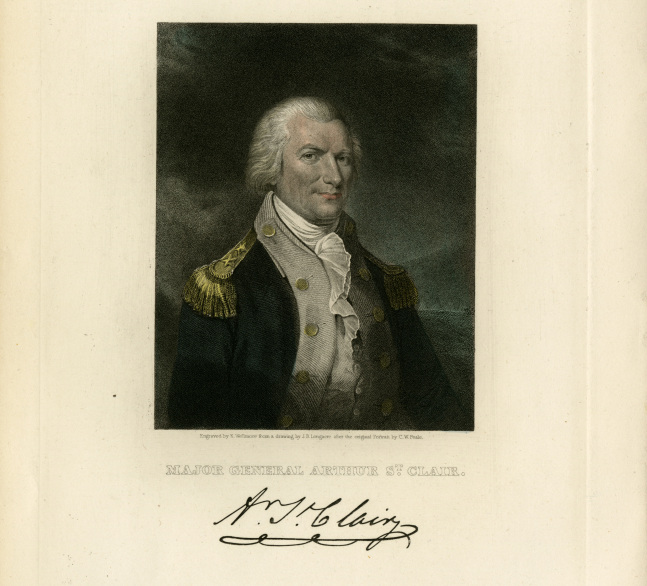
Major General Arthur St. Clair
Reproduced by permission of The Society of the Cincinnati, Washington, D.C.
To this day, Cincinnati in particular, and Ohio in general, is home to a disproportionately large number of descendants of Revolutionary War soldiers who were granted lands in the state as part of their pensions for service in the Continental Army. Additionally, nineteen of Ohio’s eighty-eight counties are named for Revolutionary War officers who were members of the Society of the Cincinnati or whose service qualified them for membership.
Like most fraternal organizations, Phi Delta Theta and the Society of the Cincinnati both have designated specific badges of membership to denote their members. To members of Phi Delta Theta, our badge (since 1849) with the familiar shield, enameled scroll being the Greek letters (ΦΔΘ), sword (added as early as 1866, but not formally adopted until 1871), and all-seeing eye readily denote the wearer as a brother in the Bond. So too with the order or badge (often referred to as an eagle) of the Society of the Cincinnati. The Institution of 1783 specifically calls for an order (or badge) of membership:
“The Society shall have an Order, by which its members shall be known and distinguished, which shall be a Medal of Gold, of a proper size to receive the emblems, and suspended by a deep blue ribbon two inches wide, edged with white, descriptive of the Union of France and America.
The principle figure Cincinnatus, three senators presenting him with a sword and other military ensigns. On a field in the back ground, his wife standing at the door of their cottage, near it a plough and instruments of husbandry, round the whole Omnia reliquit servare Rempublicam. On the reverse – Sun rising, a city with open gates, and vessels entering the Port. Fame crowning Cincinnatus with wreath inscribed Virtutis Praemium. below, Hands joined, supporting a heart, with the motto Esto Perpetua. round the whole, Societas Cincinnatorum, instituta AD. 1783.”
The general design for the order was prescribed by the Institution, but the actual eagle was designed by Major Pierre Charles L’Enfant, a Frenchman who also designed Washington, DC. The first Eagles were made in Paris in 1784 by Duval and Francastel, but later eagles were manufactured in the United States. Probably the most famous example of an eagle of the Society of the Cincinnati, is the eagle presented to General George Washington (he was serving as president general of the Society of the Cincinnati at the time) by the officers of the French Navy in 1784. This eagle is commonly referred to as the “Diamond Eagle” and has been passed down to and worn by each successive president general of the Society of the Cincinnati.
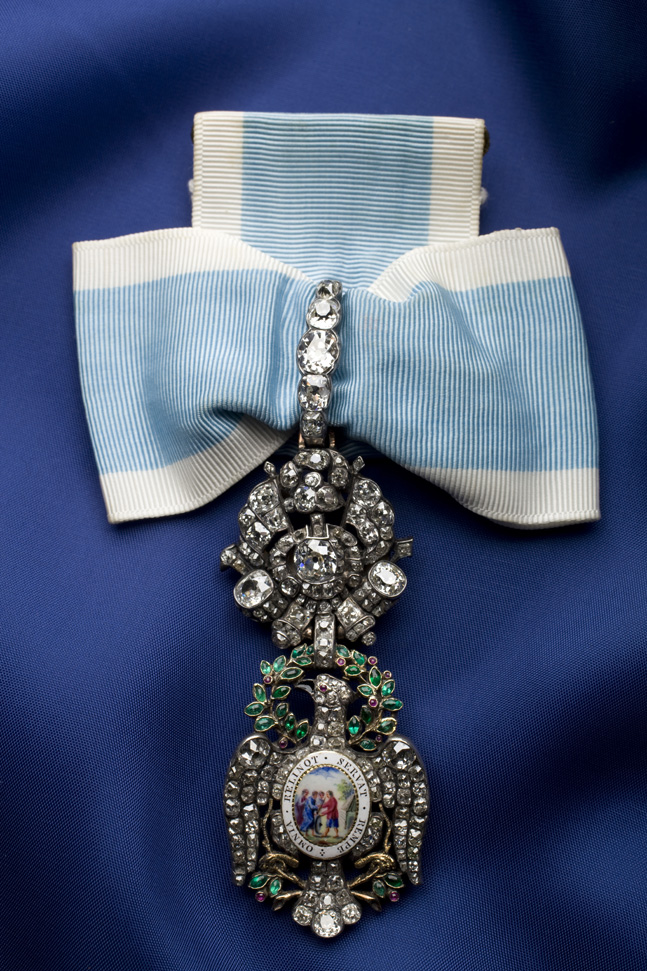
The Diamond Eagle
Reproduced by permission of The Society of the Cincinnati
Major L’Enfant was also the designer of the diploma of the Society of the Cincinnati which could be easily presented for viewing if certification of membership was required (transference of membership from one constituent society to another). The original certificates were counter signed by George Washington (president general) and Henry Knox (secretary general). Like membership certificates (shingles) in Phi Delta Theta, the diploma of the Society of the Cincinnati bears symbols and wording indicative of membership and bears the seal of the Society.
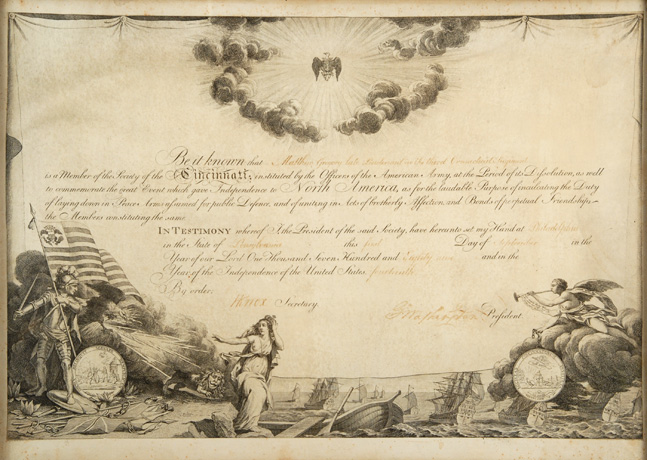
The diploma of the Society of the Cincinnati
Reproduced by permission of The Society of the Cincinnati
The deep feeling of connectedness that a brother of Phi Delta Theta feels towards the young men that shared his collegiate fraternal experience is also found amongst the members of the Society of the Cincinnati. In the Institution of the Society (which is the document [much like The Bond] upon which the Society’s founding and organization is based) this deep friendship is specifically addressed:
“To perpetuate therefore, as well the remembrance of this vast event, as the mutual friendships which have been formed under the pressure of common danger, and, in many instances, cemented by the blood of the parties, the Officers of the American Army do hereby, in the most solemn manner, associate, constitute, and combine themselves into one Society of Friends, to endure as long as they shall endure, or any of their eldest male posterity, and in failure thereof, the collateral branches, who may be judged worthy of becoming its supporters and members.”
In the years since the founding of the Society of the Cincinnati in 1783, and the birth of Phi Delta Theta in 1848, numerous men have enjoyed the privilege of being members of both organizations. Probably the most famous Phis to hold membership in the Society of the Cincinnati are President Benjamin Harrison (Miami, 1852), who was elected an honorary member of The State Society of the Cincinnati of Pennsylvania in 1889; The Honorable Frederick Moore Vinson (Centre, 1909), Chief Justice of the Supreme Court, who was elected to honorary membership in The Society of the Cincinnati in the State of Virginia in 1947; and The Honorable Samuel Augustus Nunn, Jr. (Georgia Tech, 1960), who was elected to honorary membership in The Society of the Cincinnati in the State of Georgia in 1985.
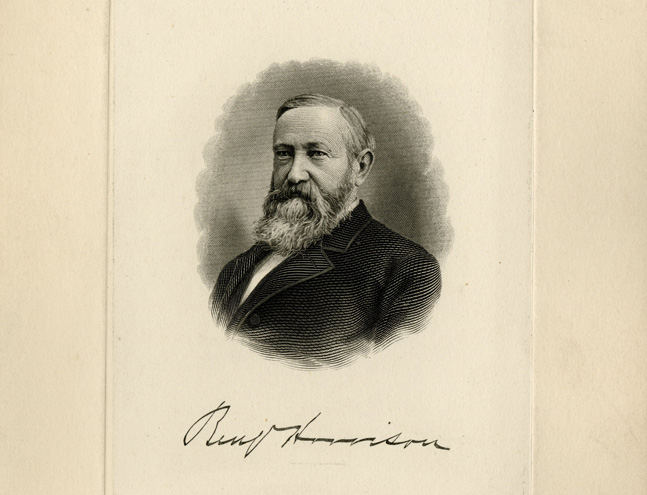
Benjamin Harrison
Reproduced by permission of The Society of the Cincinnati
Numerous other Phis have served in various leadership positions amongst the constituent societies. Most notable would be Bryan Scott Johnson (Clemson, 1981) who served as president of the Delaware State Society of the Cincinnati from 2008-2011 (Brother Johnson also currently chairs the History Committee of the General Society which oversees the annual George Rogers Clark lecture series), Francis Parker King, Jr. (UNC, 1974) who served as president of The North Carolina Society of the Cincinnati from 2009-2012, and Hollis Warren Merrick, III, M.D. (Syracuse, 1960) who served as president of Society of the Cincinnati in the State of New Hampshire from 2004-2007.
During my tenure as assistant secretary, vice president and president of the Delaware State Society of the Cincinnati, I often had occasions to write to our membership concerning fund raising and participation in various society events and annual giving drives. In doing so, I have time and time again referred to and paraphrased something that would be familiar to every Phi, our pledge oath. The pledge oath taken by every phikeia at the start of their journey to becoming a brother in Bond contains a phrase that is also very appropriate to the Society of the Cincinnati and illustrates the very core duty of members in both organizations:
“I will strive in all ways to transmit the Fraternity (Society) to those who may follow after, not only, not less, but greater than it was transmitted to me.”
In closing, I am very proud to be Phi and a member of the Society of the Cincinnati! Esto Perpetua!
Yours in the Bond,
Bryan Scott Johnson (Clemson, 1981)
South Carolina Gamma ‘243’
Author’s Note: The impetus for this article was the initial research by Ferdinand Henry “Tripp” Onnen, III (Washington and Lee, 2005) concerning Phis and Society of the Cincinnati at his alma mater. In doing additional research, I have reached out to other Phis known to me who are also members of the Society of the Cincinnati and utilized the wonderful staff and resources at GHQ, most notably Robert Allen “Bob” Biggs (Georgia Southern, 1976) and a member of The Society of the Cincinnati in the State of Virginia. My research has for the most part been limited to Phis of the twentieth and twenty-first centuries and the chart below represents my findings thus far. If anyone has knowledge of or suspects that other Phis have been members of the Society of the Cincinnati, please contact me directly (pomanob@aol.com) or through the general headquarters staff in Oxford, Ohio.

